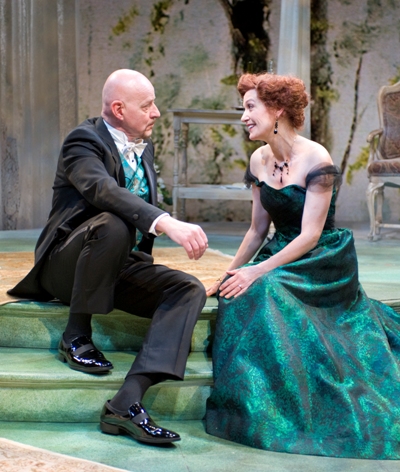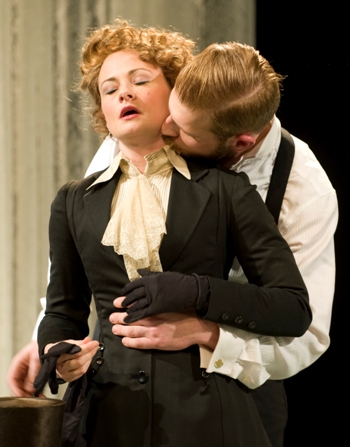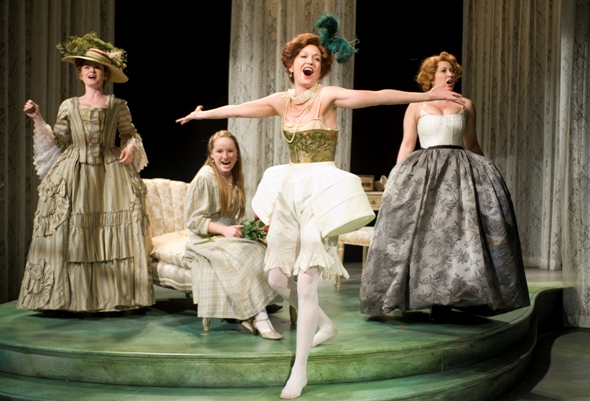Vivid characters and some great singing carry the day for ‘A Little Night Music’ at Writers’
 Review: “A Little Night Music” by Stephen Sondheim, at Writers’ Theatre through Aug. 12. ****
Review: “A Little Night Music” by Stephen Sondheim, at Writers’ Theatre through Aug. 12. ****
By Lawrence B. Johnson
“A Little Night Music,” Stephen Sondheim’s wry paean to love wacky and triumphant, exemplifies great theater as the art of ensemble. The considerable strengths among a large cast of characters at Writers’ Theatre carry the company’s compact new production a long way, even if the ideal ensemble isn’t quite there.
 The cornerstones of Writers’ ambitious staging are thoroughly rewarding performances by Jonathan Weir as Fredrik Egerman, the middle-aged lawyer who in a classic middle-age crisis has married a lovely, dewy-eyed girl who could pass for his daughter, and Brandon Dahlquist as a handsome but pea-brained count who freely cheats on his wife but watches over his mistress du jour with fiendish jealousy.
The cornerstones of Writers’ ambitious staging are thoroughly rewarding performances by Jonathan Weir as Fredrik Egerman, the middle-aged lawyer who in a classic middle-age crisis has married a lovely, dewy-eyed girl who could pass for his daughter, and Brandon Dahlquist as a handsome but pea-brained count who freely cheats on his wife but watches over his mistress du jour with fiendish jealousy.
Much of the comedy, much that’s wonderful about “A Little Night Music” springs from circumstances that have set Egerman and the count on a collision course. Never minding that they’re both married, they’re both drawn to the same “other” woman, the celebrated actress Desirée Armfeldt, played by Shannon Cochran with a fetching mix of world-weariness and unbounded independence. She and Weir’s Egerman make a credible pair of well-worn shoes.
For anyone who knows this show, the mere mention of Desirée invokes her big musical moment, “Send in the Clowns,” her comment on the misaligned circumstances that apparently will foil her shot at real happiness. Cochran’s musing account, though textured and wise, was more resigned than shattered – honest, in a dazed sort of way, an authentic reaction in the moment. A self-aware honesty, sharpened by experience and wit, is the hallmark of Cochran’s Desirée.
 The infinite popularity of “Send in the Clowns” notwithstanding, it’s probably not the peak musical moment of “A Little Night Music.” I’d give that laurel to the sequence “Now/Later/Soon,” the brilliant melding of words and music that early in the show defines Fredrik’s exasperation at his young wife’s frigidity – they’ve been married for months and she’s still a virgin — as well as her uncertainty about sex and, chiming in from an adjacent room, the utter emotional confusion of Egerman’s young son Henrik, who spends his time playing mournful music on the cello and reading the grim moral lessons of Martin Luther.
The infinite popularity of “Send in the Clowns” notwithstanding, it’s probably not the peak musical moment of “A Little Night Music.” I’d give that laurel to the sequence “Now/Later/Soon,” the brilliant melding of words and music that early in the show defines Fredrik’s exasperation at his young wife’s frigidity – they’ve been married for months and she’s still a virgin — as well as her uncertainty about sex and, chiming in from an adjacent room, the utter emotional confusion of Egerman’s young son Henrik, who spends his time playing mournful music on the cello and reading the grim moral lessons of Martin Luther.
“Now/Later/Soon” is Sondheim at his most treacherously inventive and technically perilous. We may have been looking at some opening night nerves, but this emotional tapestry turned out a bit wrinkled. Weir’s Egerman was instantly smashing, his authoritative singing voice buoying an urbane wit even as it described a suffocating spirit. But Sondheim’s exacting music occasionally eluded Kristen French’s Anne Egerman, especially in the high register, and Royen Kent’s Henrik likewise managed his cello assignment with more assurance than his vocal tasks. Musical demands aside, both actors brought youthful appeal to their opposite character types, with French as vivacious as Kent was morose.
Every appearance on stage by Dahlquist’s headstrong, narcissistic count brought new delight. A very fine singer with a natural comic flair, Dahlquist made a delicious moment of the count’s assessment of whether Desirée and this interloping lawyer Egerman had done more than sign some papers: “She wouldn’t, therefore they didn’t!” When Egerman and the count finally get to sing together, in a riotous duet reflecting on the complications of their encounter in Desirée’s dressing room, two very smart actors – and the show’s two best voices — take this production to its absolute peak.
 As the count’s long-suffering wife, Tiffany Scott simmered with delectable bitterness and a fine edge of irony. And Brianna Borger made a lusty Petra, the house maid who’s always looking for her next dalliance. Deanna Dunagan imbues Desirée’s mother, the grand dame Madame Armfeldt, with her full measure of poetic wisdom – a quality acquired in the arms of many a princely lover.
As the count’s long-suffering wife, Tiffany Scott simmered with delectable bitterness and a fine edge of irony. And Brianna Borger made a lusty Petra, the house maid who’s always looking for her next dalliance. Deanna Dunagan imbues Desirée’s mother, the grand dame Madame Armfeldt, with her full measure of poetic wisdom – a quality acquired in the arms of many a princely lover.
What is good about specific characters in this production is very good indeed. What’s really hard about “A Little Night Music” is filling its every musical nook and cranny with singers who consistently hit Sondheim’s precise marks, and that’s where Writers’ enterprise runs into problems. The opening ensemble number, “Remember,” which sets the tone of the story to follow, scarcely qualified as ensemble singing at all on opening night. On the brighter side, a tiny accompanying band of violin, cello, harp and five woodwinds (all played by Sean McNeely) – with music director Valerie Maze presiding from the piano – offered an instrumental backdrop of surprising rewards.
Director William Brown succeeds in making us forget just how small a stage he’s been handed. The show flows effortlessly and certainly without need of a traffic cop. To that end as well, designer Kevin Depinet – with just a few flourishes – allows this modest space to serve every scene and purpose.
Related Links:
- Recent Sondheim productions in Chicago include “Follies”: Read about it at Chicago On the Aisle
- Sondheim’s long line of womanizing cads includes others like Count Carl-Magnus Malcolm: Read about Benjamin Stone
- Some legendary Sondheim women assembled recently for a Broadway run of “Follies”: See the divas in flashback
- The Stephen Sondheim talks about writing “Send in the Clowns”: View it at YouTube
- Performance location, dates and times: Go to TheatreinChicago.com
Photo captions and credits: Home page and top: Count Carl-Magnus Malcolm (left, Brandon Dahlquist) and Fredrik Egerman (Jonathan Weir) are vying for the favors of Desirée Armfeldt (Shannon Cochran). Descending: Fredrik (Jonathan Weir) and Desirée (Shannon Cochran) contemplate the future. Sometimes the womanizing Count Carl-Magnus Malcolm (Brandon Dahlquist) even finds time for his wife (Tiffany Scott). Deanna Dunagan portrays the worldly wise Madame Armfeldt. Below: Desirée (Shannon Cochran, foreground) dresses for her adoring public. (Photos by Michael Brosilow)
Tags: "A Little Night Music", Brandon Dahlquist, Jonathan Weir, Kevin Depinet, Shannon Cochran, Stephen Sondheim, William Brown, Writers' Theatre


